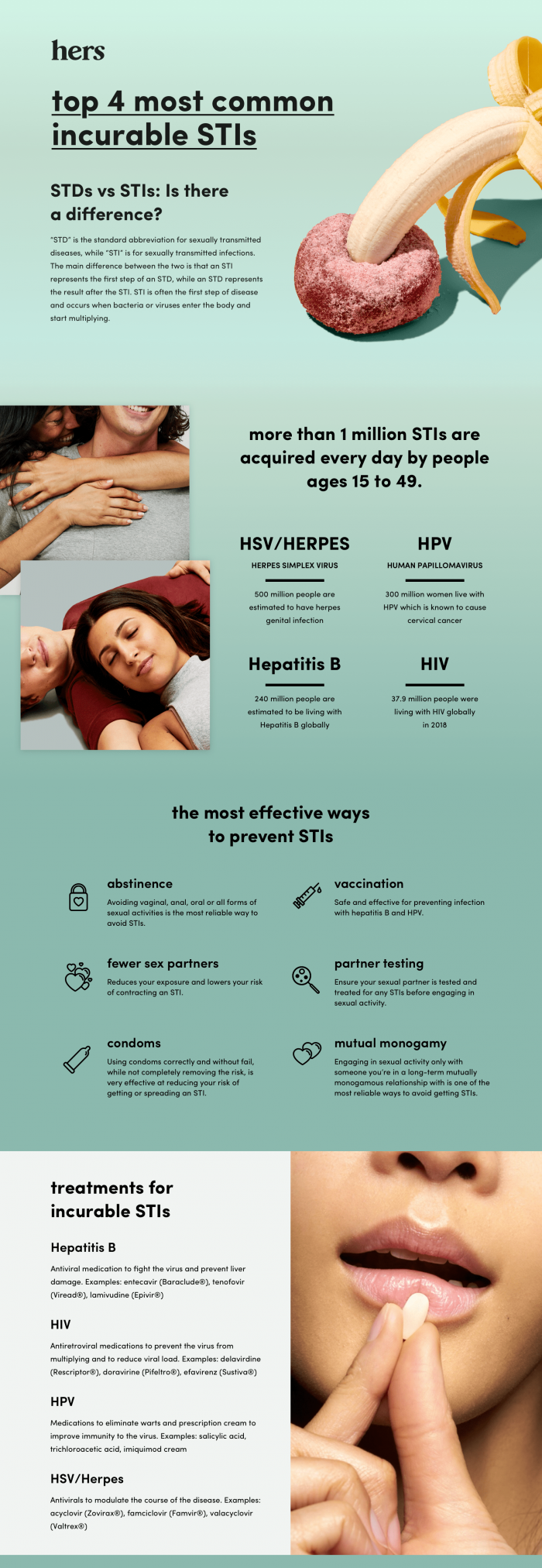Sexually transmitted infections (STIs) are extremely common, with 20 million new cases being reported in the United States each year. Almost anyone who is sexually active is at risk for contracting an STI. The good news is most STIs can be curable, and even those that aren’t can typically be managed with treatment.
Though many STIs can be treated, the symptoms can be unpleasant and may become painful. Additionally, incurable STIs can cause long-term damage to the body and may negatively affect your quality of life.
If you are sexually active, it is your responsibility to practice safe sex for your own safety and to protect the health and safety of your sexual partners. Being able to identify the symptoms of common STDs is important, but safe sex starts with knowing how to prevent the spread of STIs.
What Are the Most Common STIs?

The term “STD” is the abbreviation for sexually transmitted disease, often used interchangeably with “STI” meaning sexually transmitted infection. Though both terms get the idea across, they are technically different. An STI is an infection spread through sexual contact, while an STD is a disease that results from a sexually transmitted infection.
For example, human papillomavirus (HPV) is a sexually transmitted infection that can develop into cervical cancer. In this example, HPV is the STI, and cervical cancer is the STD.
Here is a list of some of the most common STIs:
- Human papilloma virus (HPV)
- Chlamydia
- Gonorrhea
- Syphilis
- Trichomoniasis
- HIV/AIDs
- Pubic lice
- Herpes (HSV-1 & HSV-2)
- Hepatitis B
The WHO estimates that over 1 million STIs are acquired every day worldwide. More than 500 million people are estimated to have genital herpes, and over 240 million people around the world are living with hepatitis B. As many as 300 million women live with HPV. The CDC estimates over 1.1 million people in the U.S. are living with HIV, and 1 in 7 of them are unaware of it.
The Top 6 Ways to Prevent STIs
Many common STDs like HPV, gonorrhea, and herpes present with subtle symptoms or no symptoms at all. This makes it difficult to know that you’ve been infected, which increases your risk of transmitting it to someone else.
These are the most effective ways to prevent sexually transmitted infections:
- Abstinence
- Vaccination
- Fewer Sexual Partners
- Partner Testing/Treatment
- Condoms
- Mutual Monogamy
Abstinence is the only 100% effective way to avoid contracting or transmitting a sexually transmitted infection. STIs can be transmitted through any form of sexual contact, including vaginal sex, oral sex, anal sex, or direct contact with bodily fluids. If you are sexually active, practicing mutual monogamy with a single long-term partner who has been tested can reduce your risk of getting an STI.
Vaccinations may protect against certain STIs like HPV and hepatitis B, but they don’t exist for every strain. Reducing your number of sexual partners reduces your risk for exposure to STIs, but you and any partner you plan to have sexual contact with should be tested and treated before engaging in sexual activity. Always use condoms or another form of physical protection to further reduce the risk of contracting or transmitting an STI.
If you suspect you’ve developed an STD, talk to your doctor. Blood tests and urine samples may be required to make an accurate diagnosis. Once your doctor has identified the disease, you can begin the recommended treatment.

Top 4 Most Incurable STIs Infographic
Treatment Options for Incurable STIs
According to the Mayo Clinic, sexually transmitted diseases caused by bacteria are typically the easiest to treat. A single dose of antibiotics can be enough to cure common bacterial and parasitic infections like syphilis, gonorrhea, and chlamydia. Viral infections, on the other hand, can be managed but can’t always be cured. The top four incurable STIs are herpes, HPV, hepatitis B, and HIV.
Here are the best treatment options for the top 4 incurable STDs:
- Herpes Simplex Virus (HSV) – Antiviral medications like acyclovir (Zovirax), famciclovir (Famvir), and valacyclovir (Valtrex) can modulate the course of the disease.
- Human Papilloma Virus (HPV) – Medications and prescription creams can eliminate warts, and vaccinations can protect against other strains of the infection.
- Hepatitis B – Antiviral medications like entecavir (Baraclude), tenofovir (Viread) can fight the virus and can prevent long-term liver damage.
- Human Immunodeficiency Virus (HIV) – Antiretroviral medications like delavirdine (Rescriptor), doravirine (Pifeltro), and efavirenz (Sustiva) can reduce viral load and prevent virus replication.
Your body is your own, and it’s your choice what you do with it. If you’re going to engage in sexual activity, it becomes your responsibility not just to protect yourself but also to protect your partner. Practicing safe sex and having regular STI screenings can minimize the risk of contracting or spreading STIs, including incurable forms like HPV, HSV, HIV, and hepatitis B.
Thank you for reading.








